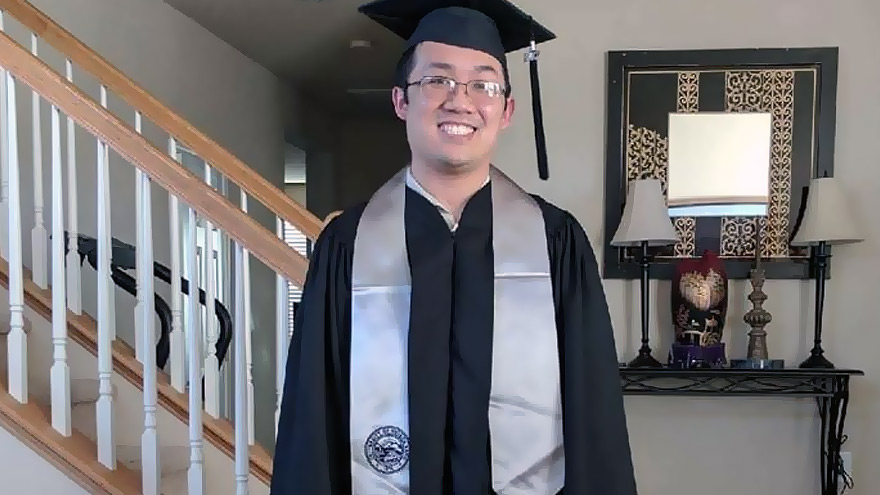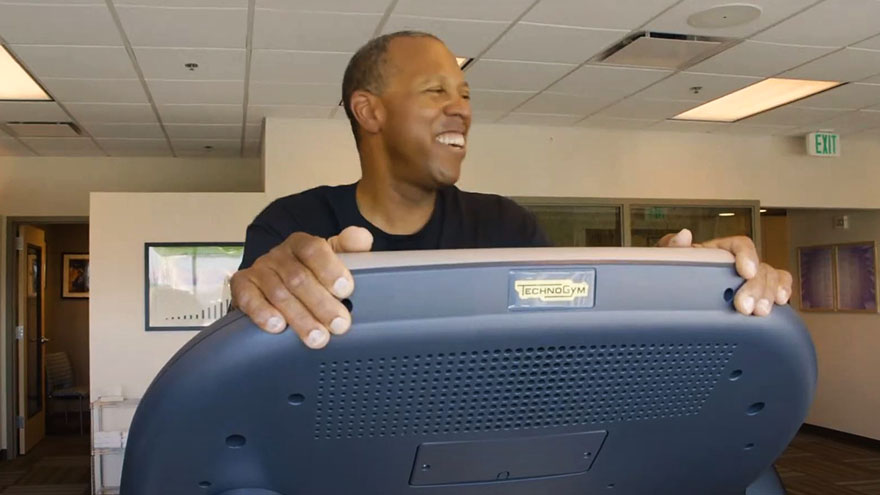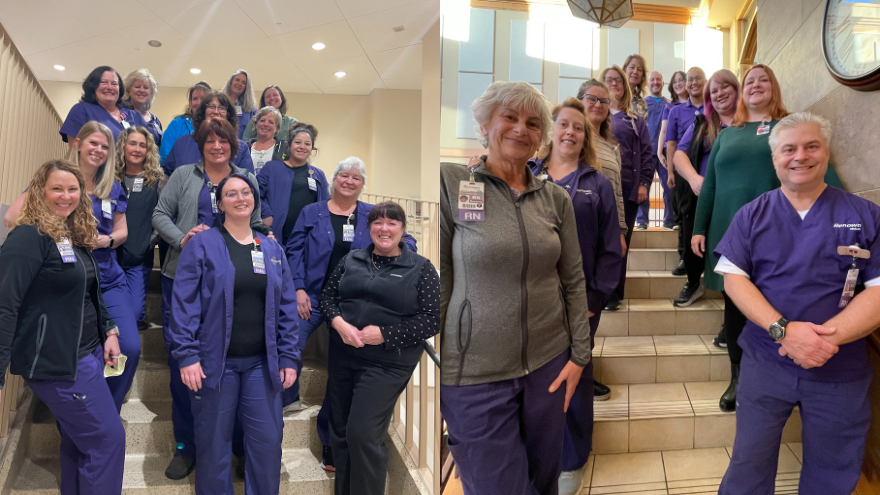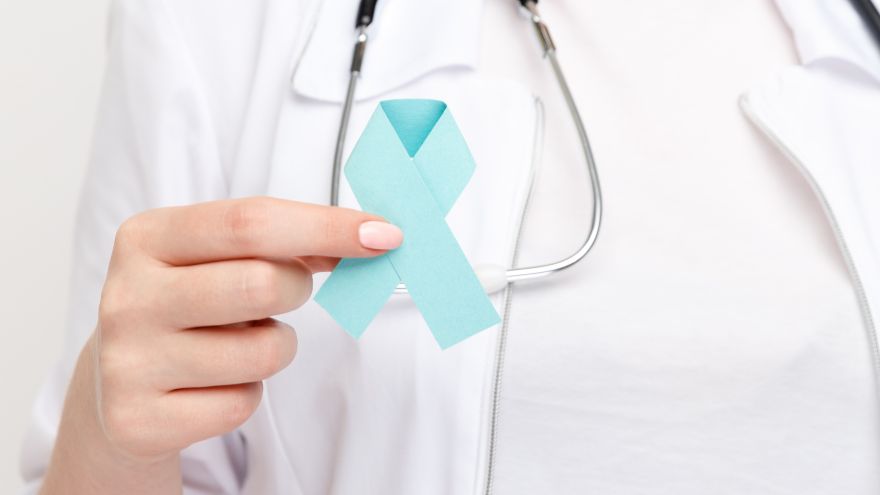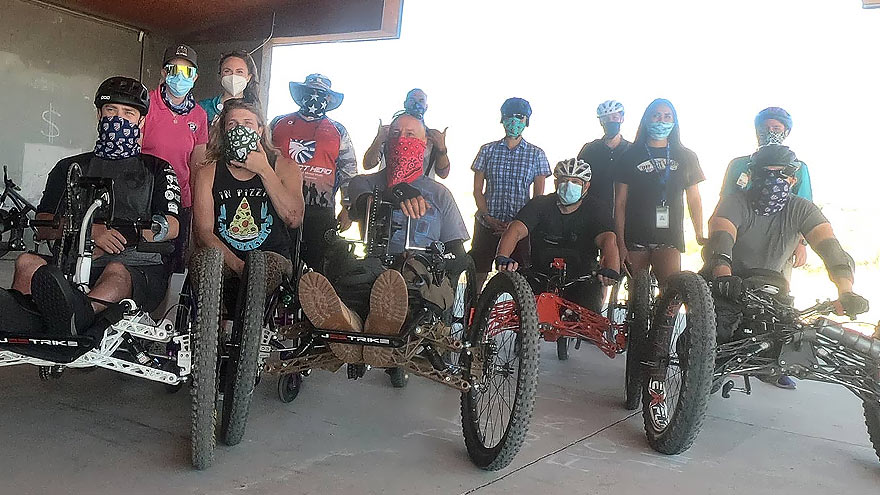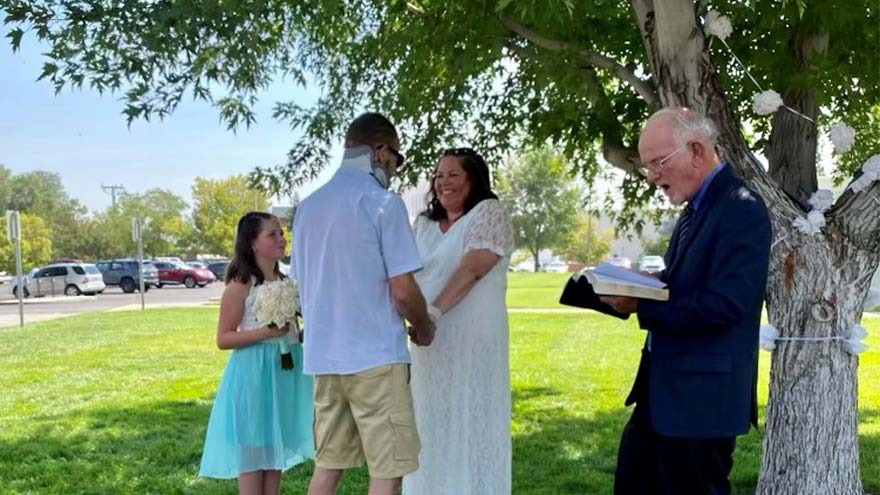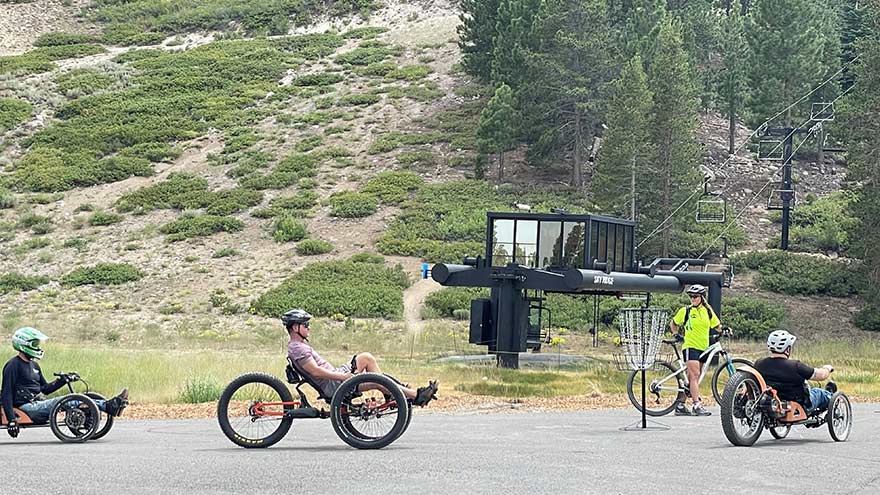Search
-
Perseverance and Physical Therapy Help UNR Student Walk Again
University of Nevada, Reno student Khoa Le was paralyzed in 2010 after a longboarding accident. Through physical therapy, a positive attitude and sheer will, Le is walking again. This weekend, Le will walk across the commencement stage to accept his college diploma. “Walking around on my own power is just the greatest feeling,” says Khoa Le, a senior at the University of Nevada, Reno. Just after finishing summer school at the university in July 2010, his whole life changed within seconds after stepping on a longboard skateboard for the first time. He lost control of the board and hit the curb, causing paralysis on the left side of his body. His journey to recovery began at Renown Health Physical Therapy & Rehab. His physical therapist, Dina Barry, says he never complained once in four years. “I started seeing Khoa in April 2011, and we worked for four years together,” says Barry, a lead physical therapist at Renown. “Everything I’ve ever asked him to do, he does. Le is a hard worker, is continuously optimistic and smiling, and I think that is why he’s accomplished what he has.” Le plans to pursue a career as an information systems manager.
Read More About Perseverance and Physical Therapy Help UNR Student Walk Again
-
Going the Distance to Get Heart Healthy
After having a heart attack, a Mammoth resident travels to Reno to complete rehab. He’s already lost 15 pounds and gained a healthier outlook on life. Eric Smith travels from his home in Mammoth Lakes, Calif., to Reno twice a week to participate in Renown Health’s Healthy Heart Program. “Living in Mammoth, it’s a three hour drive for me up here. Well, it’s my life or it’s a drive,” says Healthy Heart Program participant Eric Smith. The Mammoth Lakes, Calif., resident travels to Reno twice a week to participate in the 72-session program. which includes heart-healthy classes, exercise sessions and cooking demonstrations. “The cardiac rehab program here is excellent,” Smith says. “It is the only program that I am aware of that combines nutrition and exercise together. What’s the point of exercising to get your heart strong if you are still eating poorly and not educating yourself on that?” Smith’s heart issues began when he was 46-years-old. He received an angioplasty, which is a stent to hold a coronary artery open. Two years later, Smith had a heart attack and was flown to Renown Regional Medical Center for emergency bypass surgery on four arteries to allow blood to flow to his heart more freely. An avid skier, ski racing coach and tile setter, Smith admits that it is sometimes difficult to eat right when you’re on the go in a tourist town. Since starting the cardiac rehab program, Smith says he is feeling more optimistic on making lasting lifestyle changes after meeting other people who are going through the same challenges, like food cravings and trying to get stronger. “The big thing is getting educated on food,” says Smith, who has swapped out heavy breakfasts for whole grains and fruit, and steak dinners for baked fish. In just a few months of starting the program, Smith lost 15 pounds. He looks forward to passing along what he’s learned to his friends. “Everybody benefits from this program, especially if you have experienced a heart attack,” Smith says. “But if you don’t have those issues, you can still get the benefits from eating healthier.”
-
How Do I Prepare for Surgery?
Renown’s team of nurses and respiratory therapists discuss what you need to know before undergoing surgery, including fasting guidelines and how to improve recovery. There are several things to know before you undergo surgery, including steps to prepare at home in advance of your procedure. Fasting Guidelines: No solid foods eight hours prior to surgery You may have clear liquids three hours before your surgery. Clear liquids include water, apple juice and lemon or lime-flavored soda water (not cola). In addition, do not chew or smoke tobacco (regular or e-cigarettes) after midnight the night before your surgery, unless instructed by your doctor or anesthesiologist.
-
Why Can't I Eat Before Surgery?
If you’re having surgery on your shoulder, why does it matter what’s in your stomach? We asked Dr. Matthew Hoberg to explain more about pre-surgery directives, including fasting. If you have an upcoming surgery, your care team likely gave you instructions to fast before your procedure. But why? We asked Matthew Hoberg, M.D., medical director of Renown Surgical Services, to explain why it’s important to forgo food and drinks before surgery. Why are patients instructed to fast before surgery? Regardless of surgery type or site, we want the stomach to be empty before having anesthesia, because anesthesia can reduce your body’s ability to protect and prevent food or acids from the stomach from entering the lungs. Normally, your body is able to prevent this, but anesthesia medicines make it harder for your body to do so. When food or liquids from the stomach get into the lungs, doctors call it “aspiration.” This is rare, but can be dangerous if it does happen. Solid foods and liquids leave the stomach at different rates too. Solid food takes longer to empty from the stomach than liquids, so the time to stop eating solids (eight hours) is longer than that for clear liquids (two hours). The body has energy reserves to produce needed nutrients and fuel during fasting. Recently, studies have shown it is important to stay hydrated and have some carbohydrates in clear liquids up to two hours before surgery, so clear liquids are allowed until two hours before surgery. There are also special rules for babies and young children who need surgery. For example, you may give breast milk up to four hours before surgery. If your baby drinks formula, you should stop six hours before surgery, and all solid foods you should stop eight hours before. Your child’s doctor or nurse will give you exact instructions. What if you show up for surgery and have broken the no-eating rule? Will surgery be re-scheduled? If patients have not followed the fasting guidelines, surgery will be postponed or rescheduled due to the possible increased risk associated with not having an empty stomach. The exception would be emergency surgery that cannot be delayed in which case special precautions are taken to help prevent anything from getting into the lungs. What other pre-operative rules should be followed to the letter? All instructions given to patients before their surgery or procedure should be followed. There are specific medical reasons behind all the instructions and they are designed for safety — to minimize risks, lower complications like infections and enhance the recovery process to help patients get back to normal as quickly as possible. Also, many patients ask if they should continue taking medications before surgery. The answer is: It depends. Your doctor or nurse will tell you which medicines you should take and when. Some medicines need to be stopped before surgery. But for others, it’s important you keep taking them as usual. You may also get new medicines to take before surgery. You may be asked to take some medications before surgery as part of advanced pain management protocols. If you need to take medicine right before your surgery, you can take it with a sip of water.
-
Want to Recover from Surgery Faster? Get Moving!
To be on the move is a scary concept when you’re recovering from surgery. But did you know getting up and at ’em could be the key to a quicker recovery, post-surgery? Here’s some expert insight from Renown Surgical Services. The team at has some news for you: Rest and movement are important to prevent serious complications. Here are some tips about how to get mobile after your procedure — and why it’s fundamentally important. Tip 1: Start Simple While you’re in bed, move your legs and feet up and down. Be sure to ask the nurses to help you get out of bed and into the chair for all your meals, or walk to the bathroom when needed. If you feel up to it, take a walk in the hallways with the nursing staff. Tip 2: The Sooner, the Better This may be surprising, but too much rest is not necessarily a good thing. The old saying “You use it, or you lose it” rings very true to maintaining the strength needed to get yourself out of bed. Beginning the mobility process early in your hospital stay will not only help you maintain strength and function, it may also help you get home sooner. Though it may seem counter intuitive, lying in bed all day can delay your healing time and cause serious complications to arise, including pneumonia, deep vein thrombosis or blood clots, pressure ulcers and sometimes constipation. Tip 3: Mobilize Your Support System Getting out of bed, sitting in a chair for meals and walking around your room or hospital unit can help reduce your risk of complications. The nursing staff will help you out of bed the same day of your surgery if it’s cleared by your doctor. Tip 4: Safety First The nursing staff is here to keep you safe, so make sure you call them for assistance getting out of bed. Even if you think you can do it yourself, use your call light to notify the nursing staff you are ready to get up and move. In addition, new medications can sometimes impair our judgment, balance and safety, so it’s always better to have help even though you may not need it. This is also why you may have a “bed alarm” on, to remind you to call for help and keep you safe while you are recovering. Tip 5: Move, But Manage Your Pain Many people find that getting up and moving actually helps their pain, rather than making it much worse. Taking the right amount of medication at the right times will minimize your pain and help you to get moving. Your care team will work with you on how much pain medication is right to manage any postoperative pain, with the goal for you to be comfortable enough to be able to move and gradually increase your activity each day. Tip 6: Maintain that Momentum at Home Mobility doesn’t end once you’re discharged from the hospital. It’s key to keep moving to maintain health and function. When you first arrive home, it’s crucial to take frequent movement breaks throughout the day. Increase activity as it becomes more comfortable, and be sure to ease back into an active daily routine. If you have concerns about your mobility once home, be sure to discuss this with your doctor at your follow-up appointment. Renown Surgical Services | 775-982-3993 Ask your doctor if you have any questions about your medical condition or the specific surgical procedure planned, or contact the team at Renown Surgical Services. Learn More
Read More About Want to Recover from Surgery Faster? Get Moving!
-
Is Bariatric Surgery Right for You?
You’ve likely heard about bariatric surgery — and perhaps even have friends who’ve done it. But is it a potential solution for you? Here, Dawn Remme, RN, Metabolic Bariatric Surgery Program Manager, provides insight. You may have been struggling with excess weight for years. You’ve tried high-protein diets, low-carb diets and more. Most patients considering weight loss surgery have tried numerous dieting methods. The truth is, some patients who suffer with obesity are successful dieters. Unfortunately though, excess weigh often returns. This impacts their health and the quality of their life. It can be a disheartening battle. Weight loss surgery is a big decision. In making this decision, keep in mind that surgery is only one step toward your goal of achieving better health. It is neither magic, nor is it the “easy way out.” Weight loss surgery can offer you a TOOL to help you become more successful in controlling the disease of morbid obesity. By combining this tool with a lifelong commitment to important lifestyle changes, medical follow-up and nutritional modifications, you have the potential to become a healthier you. Bariatric Surgery By the Numbers Exploring the facts about obesity, how it impacts your health, and how surgery can resolve or significantly improve your chronic medical conditions is the first step to making a decision. Obesity is medically defined as “excess body fat” and is measured by a mathematical ratio known as the Body Mass Index (BMI). To calculate your BMI, we consider your height, weight, age, gender and body build. Here are the standards: “Normal” BMI: less than 25 Overweight: 25 – 29.9 Obese: BMI of 30 – 39.9 Morbid obesity: BMI of 40 or more Morbid obesity (BMI over 40) is a lifelong, progressive disease, and the prevalence of morbidly obese Americans (100 or more pounds over a healthy weight) is increasing rapidly. According to the CDC, the disease of obesity affects 78 million Americans. Further estimates indicate about 24 million have morbid obesity. Serious medical problems known as co-morbidities often occur when someone is morbidly obese. Studies tell us conditions such as type 2 diabetes, high cholesterol, sleep apnea, high blood pressure and degenerative arthritis increase in severity as the BMI is increasing in patients. When may weight loss surgery be an option? When someone has a BMI greater then 40. If a person’s BMI is 35 – 39.9 and they have significant health problems such as type 2 diabetes, high blood pressure, high cholesterol, sleep apnea, or other diagnosed health conditions related to obesity. Gastric Sleeve, Gastric Bypass Explained To resolve or significantly reduce these health conditions, bariatric surgery can be done when diet and exercise haven’t worked. Weight loss surgery makes changes to your digestive system to help you lose weight. The gastric sleeve limits how much you can eat, whereas gastric bypass limits how much you can eat and reduces the absorption of certain nutrients. Other Benefits of Surgery You can greatly increase life expectancy by resolving or significantly improving conditions like diabetes, high cholesterol, high blood pressure, sleep apnea, and obesity itself. Infertility can also be positively affected. A significant weight loss and relief from serious health conditions and diseases will greatly improve your quality of life. Studies tell us that type 2 diabetes is resolved or significantly improved in 84 percent of patients following bariatric surgery. Cholesterol levels dropped in 95 percent of patients. And hypertension and sleep apnea showed improvement in 68 and 80 percent of patients, respectively, following bariatric surgery. Bariatric Surgery at Renown In making the decision to move forward to better health, it is important to remember: Obesity is a disease, and the desire to have a healthier, longer, more fulfilling life is possible. If you are interested in learning more, please visit the Bariatric Surgery Program page to view more information about Renown Regional Medical Center’s MBSAQIP accredited bariatric program, as well as information about upcoming educational seminars. Or call 775-982-RSVP (7787) to reserve your seat. Learn More
-
Preventing Spinal Cord Injuries: What to Know
If you're not taking safety precautions during mountain sports, you could be at risk for a spinal cord injury. Dr. Benjamin Pence of Renown Rehabilitation Hospital explains the best way to prevent this serious injury. Mountain sports are a big part of the winter season here in our area, but if you’re not practicing all the proper safety techniques, you could end up with a serious spinal cord injury. Benjamin Pence, MD, Renown Rehabilitation Hospital, is here to offer tips to prevent this serious injury while you’re out enjoying what the Truckee Meadows has to offer. What is the spinal cord? The spine stretches from the base of your skull to the coccyx (commonly referred to as the tailbone). Your spine is made up of 24 vertebrae—seven cervical, which are in your neck, 12 thoracic, which are in your chest, and five lumbar, which are in your lower back. There are ligaments and muscles attached to each vertebra. These facilitate back movement and protect the bones from damage. There is cartilage between each vertebra which acts as a shock absorber for your spine. Finally, the spinal cord is a long, thin, tubular bundle of the nervous tissue and support cells that is enclosed in the spinal canal and send signals from the brain to everything from your arm and leg muscles to bowel and bladder function. The brain and spinal cord together make up the central nervous system.
Read More About Preventing Spinal Cord Injuries: What to Know
-
Department Spotlight: Surgical Preadmission
Heading into surgery of any kind can bring along feelings of intimidation. With a best-in-class surgery team at Renown Health, patients rest assured that they are in the most capable hands for their entire procedure from start to finish – and while the physical preparation is vital, mental and emotional preparation is equally as important to ensure each patient has a smooth and comfortable experience. The Surgical Preadmission department (a.k.a. “preadmit”) at Renown Regional Medical Center and Renown South Meadows Medical Center is a dynamic and compassionate group of nurses, case managers, chart managers and more who are dedicated to guiding each patient through the surgical process. With extensive knowledge and expertise under their belt, the teams are equipped to make a genuine difference in the health and well-being of all patients, for all surgeries, at all times of the year. Surgery Starting Ground The Surgical Preadmission teams are crucial aspects in the successful outcome of every surgical procedure. Comprised of skilled healthcare professionals, this department is dedicated to providing comprehensive support and care before heading into the pre-operating room. “Our job is to prepare every patient for surgery, make sure all their pre-surgery testing is done, ensure they understand their fasting and medication instructions, have had their questions answered, have a ride home and know what to expect during surgery and after so their recovery can go smoothly and without complications,” said Debra Bennett, RN, Supervisor of Surgical Preadmission at Renown Regional. “Each patient is unique, so each experience is different.” Our preadmit nurses are the masters of communication, directing thorough assessments – including medications, tests and clearances – and addressing any questions or concerns patients may have, never missing the opportunity to inform them of exactly what they will expect in surgery. “I do a complete history on every patient while giving them detailed pre-operating instructions and helping them answer any questions to the best of my ability,” said Nancy Hilts, Surgical Preadmission RN at Renown Regional. “I am proud to be able to help allay their fears and concerns using my 30 years of pre-op experience. I offer an avenue for them to feel comfortable opening up to me.” “We always tell patients that they have great surgeons and a fantastic team that will be watching over them and taking care of them every step of the way,” added Jon Capallupo, Surgical Preadmission RN at Renown South Meadows. “We also give them plenty of educational handouts and video content, in addition to verbal instruction, to ensure they are as prepared as possible.” The nurses then pass the reigns onto the chart managers, who prepare the charts for surgery and ensure all documentation is up-to-date before sending them to the pre-operative team. The expert surgical case managers also step in to prepare a thorough discharge plan, along with reviewing pre-operation orders for status, consent, codes and more. The team does several of these initial visits virtually, and they are looking forward to soon phasing all preadmit case manager preliminary visits into a virtual model. From assisting the pre-op and post-anesthesia care unit (PACU) teams with discharge planning concerns to helping on the outpatient side with anything from oxygen equipment and catheters to transportation issues and those experiencing homelessness, our pre-admit case managers are always up to the challenge. "We are true patient advocates, alleviating concerns and fears along the way,” said Mary Carl, RN, Case Manager at Renown Regional. “Just to name a few things we do on a daily basis, we see our total joint and non-weight bearing patients during their preadmission appointment, so they are aware of the medical equipment they need and if it is covered by insurance; provide education for Aspira catheters and gastrostomy tubes; advocate to ensure tube feeding and dressing changes are set up for hospice and home health patients; and escalate concerns of patient safety to ensure a safe discharge.” In the midst of it all, there is never a dull moment in the preadmit teams. At Renown Regional alone, the preadmit professionals see more than 1,600 patients a month – and each one has a hyper-personalized experience with their very own preadmit team. “Many times, we are the first impression a patient has on our organization; after all, we touch more than 97 percent of patients that are scheduled for surgery, cardiac catheterization lab procedures or interventional radiology,” said Amy Schler, Surgical Preadmission RN at Renown Regional. “We also collaborate with many other departments in the hospital as well, from surgeons and anesthesiologists to case managers and nurse navigators. Our work in preadmit impacts the entire surgical process.” Holding a diverse array of experiences, our preadmit department plays an integral role in our commitment to providing the highest quality of care to every patient. Knowledge is Power Heading into surgery feeling fearful and worried is normal for any patient. However, how would you feel knowing that each individual member on your preadmit team has, on average, 23-25 years of experience in the field? This is the reality for our Surgical Preadmission department – and they put that vast knowledge to great use to bring a sense of calm to patients. “Our team members have worked in various departments within our organization, and they bring a wealth of knowledge that we share with each other, and most importantly, with our patients,” said Amy Schler, RN. “If you have hundreds of years of nursing experience, you can speak not only as a nurse but also as a patient. It allows you to give a more personal perspective on what patients can expect in their recovery. Being able to assess their emotions and provide feedback to our pre-op and PACU teams help the patient have a better experience.” “Many of our nurses have close to 40 years of experience each, and they have an extremely large knowledge base since we see patients from newborn to geriatric and from easy procedures to complex surgeries,” added Debra Bennett, RN. “Another great aspect of our team is the varied nursing backgrounds we all hold – surgery, pre- and post-op, labor and delivery, pediatric intensive care, cardiology, gastroenterology, urology, cardiac cath lab, home health and everything in between. Communication between departments is so important!” All members in this department, regardless of which clinical area they came from, surgical or non-surgical, can easily translate their skills into the work they do in preadmit – and they only continue to grow. “As a surgical preadmission nurse, I have used my years of experience as a nurse in surgical services,” said Terri Delatorre, Surgical Preadmission RN at Renown Regional. “I started as a floor nurse with orthopedics for 12 years, and then I worked with the PACU for 11 years. This has helped me give great understanding and care to our surgical patients.” “Because we have staff with such a vast knowledge base, we can rely on our years of working within our organization to help alleviate fears that the patient may have,” added Amy Schler, RN. We can prepare them for what to expect in pre-op and PACU and educate them on what to expect post-op, including any barriers they may face. For example, mastectomy patients may not realize they will not be able to raise their arms for 7-10 days post-op, and total knee patients have to navigate stairs and housing access. Helping patients think about barriers at home that they may not have thought about helps them prepare prior to surgery, enhances their healing and provides a better surgical experience.” The preadmit team works closely with our best-in-class surgeons and anesthesiologists, continuing to grow their expertise along the way while learning alongside our talented providers. For instance, when it comes to our Renown South Meadows preadmit department, anesthesiologist Nariman Rahimzadeh, MD provides excellent guidance for the entire team on state-of-the-art anesthesiology practices. “I am very proud of the work we do with Dr. Rahimzadeh,” said Lisa Closson, Surgical Preadmission RN at Renown South Meadows. “Together, we ensure patients are safe for both surgery and anesthesia.” Despite the challenges that come their way – whether it be changes to process and workflow to navigating support for patients after they leave the surgery floor – the preadmit team cleverly uses their collective wealth of knowledge to bring hope and comfort to all patients. “Our nurses are such warm, caring and compassionate humans that do their best to ease any fears and anxieties patients may have,” said Debra Bennett, RN. The Pride of Preadmission The pride of our preadmit team lies in their ability to make a positive impact on all patients they serve. To them, their work is not just a job – it's a calling. And they do it all while working together to elevate their team and performance. “Our team is most proud of the quality of care we provide to our patients and our abilities to troubleshoot difficult situations to ensure they have a great surgical experience here at Renown,” said Mary Carl, RN. The entire department supports each other by working collaboratively and relying on each other’s expertise to provide the best possible care for patients. They understand that their success as a team depends on their abilities to support and help each other. “Our team is awesome here at South Meadows,” said Jon Capallupo, RN. “We can turn to each other for support, and we all work very well with each other. I am glad to be a part of this team.” “I am proud of how well all of us in preadmit works with each other every day,” added Lisa Closson, RN. “We try to make patients feel comfortable from the moment they arrive to the time they leave the department.” The pride that our preadmit team expends goes beyond their departmental limits – these team members are also trusted teachers. They work closely with cancer nurse navigators to teach weekly classes for patients who have been newly diagnosed with breast cancer, coupled with lymphedema prevention and education classes. The team also encourages participation in Renown’s free smoking cessation programs to help their patients learn the risks and benefits of quitting smoking. When not serving patients or teaching classes, you can find many of these team members taking charge of multidisciplinary committees within our health system, including breast leadership, gastroenterology leadership, shared governance, infection control and recruitment and retention. On top of it all, this team certainly knows how to celebrate, with several of their members being a part of their own department-wide Celebration Committee, where they gather for retirement parties, baby showers and team get-togethers. Always active and never passing up a challenge, our preadmit department are shining examples of Renown’s Culture Commitments, especially Caring and Collaboration, and the pride in the vital work they do every day is limitless. “I am so happy my position in preadmit opened up for me at a time when I was really feeling challenged in my career,” said Nancy Hilts, RN. “The team that we have here is amazing. I am so grateful and thankful every day for the opportunity. It is an amazing place to work!”
-
Learn How to Manage Lymphedema
Katherine Bunker, Physical Therapist and Certified Lymphedema Therapist (PT, DPT, CLT) at Renown, discusses how patients can manage lymphedema with changes to daily routines along with diet and exercise. Lymphedema is a condition that affects millions of people around the world. It is a chronic and progressive disorder that results in swelling of the arms, legs, or other parts of the body due to an accumulation of lymph fluid. Lymphedema can occur because of cancer treatments, surgery, or other medical conditions. Managing Lymphedema Treatments to help reduce symptoms such as pain, swelling and discomfort associated with lymphedema can include compression garments, exercise, skin care, manual lymphatic drainage and pneumatic compression. The goal is to avoid triggering the onset of lymphedema. Lymphedema can present itself immediately after surgery or radiation. It can appear months later or even years later. There are many factors that influence the development of lymphedema which is why prevention is so important. If you have had injury or disruption to your lymphatic system, then: Avoid injuries to the skin near the affected area. For example: wearing gloves during gardening, using bug spray to ward off mosquitos, covering your limbs while playing with pets, keeping nails clean and avoiding cutting too close to cuticle, utilizing electric razors at the armpit (instead of a traditional razor)., Avoid blood pressure readings to the affected limb or request blood pressure to be taken manually, not by a machine. Avoid heat like saunas, hot tubs, sunburns, hot packs, and even massages. Avoid tight jewelry like rings or bracelets, which can be too tight.
-
How a New Recreation Therapy Program Creates Valuable Bonds
The Recreation Therapy Alumni Program is a new addition to Renown Rehabilitation Hospital’s current programs. After daily hospital physical therapy ends, it is an opportunity for other adventures. Shaun Stewart, CTRS (Ceritified Therapeutic Recreation Specialist), tells us about the new Renown Alumni Recreation Therapy Program, its partnership with the City of Reno and upcoming events. It’s no secret that being active and social supports a satisfying, happy life. With this in mind, the Renown Alumni Recreation Therapy Program reinforces this idea. Its goal is to help patients experience the energy, teamwork and commitment that sports and recreation provide beyond the hospital walls. “We are happy to partner with the City of Reno’s adaptive and inclusion programming to create an active community of adaptive sports participants. There are many options for outdoor recreation in our area. This program looks to share these opportunities with those with a traumatic spinal cord injury,” says Shaun. April Wolfe, CTRS, with the City of Reno adds, “The program’s main objective is to empower individuals living with spinal cord injury to live and recreate independently in the community. We also want them to enjoy the activities, improving their emotional and physical well-being by taking part in the Renown Alumni Recreation Therapy program.” First Successful Therapy Event On Aug. 27, 2020, the recreation therapy program’s first event was an introduction to adaptive mountain biking. Eight participants enjoyed a morning of adaptive biking thanks to a grant in partnership with the City of Reno. “Getting back to an active leisure lifestyle following injury can increase your quality of life both socially and physically,” explains Shaun. “It was great to be outside with people of all abilities enjoying the beautiful Nevada sunshine.” We encourage patients of all abilities to develop active skills, make lasting friendships and, of course, have a blast. Certainly any activity is possible with adaptive equipment and a motivated attitude. Future Recreation Therapy Events Below are the details for the next event. Event: Introduction to Wheelchair Rugby Learn the rules of the sport and play with local athletes. When: Sunday, Nov. 1, from 2 – 5 p.m. Where: Evelyn Mount Northeast Community Center, 1301 Valley Rd., Reno, NV 89512 Cost: Free RSVP: Shaun.Stewart@renown.org or 775-982-3612 by Tuesday, October 26, 2020 This event has a 10 participant limit, following six feet distancing guidelines. Please bring a mask to wear. In particular, this will be a learning event and no scrimmages will occur Rugby wheelchairs will be provided. Please RSVP, to ensure the reservation of the appropriate equipment. In case you cannot attend this event, please look for upcoming events which will include adaptive archery, skiing and scuba diving. Renown Rehabilitation Hospital | 775-982-3500 Renown Rehabilitation Hospital is the region’s only hospital with certification by the Commission on Accreditation of Rehabilitation Facilities (CARF). It is certified for: Comprehensive Integrated Inpatient Rehabilitation Program Stroke Specialty Program Medical Rehabilitation Case Management Take a Virtual Tour
Read More About How a New Recreation Therapy Program Creates Valuable Bonds
-
Love Endures - A Remarkable Recovery Leads to a New Future
It’s true that a road trip can change your life, and it did for Sergeant Brandon Ott, just not in the way he was expecting. For nine years, Brandon worked alongside his friend, Denton Tipler, at the police department in Florence, Oregon. To break the monotony of the COVID-19 lockdown, they planned a ‘guy’s trip’ - a pandemic safe, motorcycle adventure traveling through Idaho and Washington. On the morning of July 22, 2020, they set out on their journey. But by 8 p.m., they ran into rough weather - with wind, poor visibility and heavy rain as they rode into Nevada. Four miles from their destination, on a desolate stretch of Highway 140, a gust of wind hit Brandon. Denton watched in disbelief as his friend bounced, tumbled and ultimately came to a stop after sliding over 100 yards. He flagged down the next vehicle, a semi-truck, and the driver did traffic control while another passerby drove to get cell service and call 911. A Distressing Call About 10 p.m. the same night, Angie Brog, Brandon’s partner, picked up her phone at the Florence police station. A Nevada highway patrolman let her know Brandon was in a motorcycle accident and had been taken to a hospital in Winnemucca, NV. From there he took a life flight to Renown Regional Medical Center. Angie immediately called Brandon’s parents and told Addison, their 9-year-old daughter, the news. They quickly packed their bags and drove to Nevada. On the drive to Reno, an ER doctor called Angie to give her Brandon’s status, “I can’t thank him enough. I was so worried. He even gave me his personal cell phone number.” Upon arrival, she ran to see Brandon in the trauma ICU. “His face was shattered, he had a collapsed lung, a tube was down his throat and something was in his head to relieve pressure from his swelling brain,” she remembers. “He was not expected to live.” While Brandon was in a coma for three days, Angie was by his side, trying to come to grips with a new normal. “The doctors did not sugarcoat it,” she recalls. “They told me to prepare myself if he pulled through.” It was a rough week in the ICU with Brandon heavily sedated, so he could heal. From there he was transferred to the neurology floor, where he slowly improved. While there, his daughter Addison got to see him for the first time. Angie says, “When Addison saw her daddy for the very first time, she was relieved, happy she could hug him, and that he was alive.” Miraculously his legs were not broken and he was able to hold simple conversations and walk a few steps. As the days went on, Brandon’s dad returned to Oregon, and the Inn at Renown became the family’s new home. “It was such a blessing to be so close to Brandon,” Angie observes. “It allowed us to relax a little being in the same building and let us settle in.” The Comeback Brandon’s first memory after the accident was waking up in the Renown Rehabilitation Hospital, 16 days after his accident, not knowing where he was. (Brandon experienced amnesia due to his brain injury and doesn’t remember the days prior to his rehab stay.) He recalls looking around the hospital room and seeing the photos Angie posted of their family on the walls and wondering, “How did they get pictures of my family?” Immediately after learning that Brandon was awake, Angie raced back to the hospital, went outside his window and talked to Brandon on the phone, reassuring him that they were there for him and everything was going to be ok. The next morning, he saw Addison for the first time that he remembered since his accident. They each put their hands to the hospital window “touching” each other in an emotional reunion. During the pandemic, each rehab hospital room was designated with an animal, so family and friends could visit outside safely. Brandon was in the ‘moose’ room. “Whoever thought of that was a genius,” notes Brandon. A new phase of Brandon’s recovery began at the rehab hospital. "He worked so hard while he was there,” Angie shares. With a minimum of three hours of daily therapy sessions, including speech, occupational and physical therapy. Angie participated in every aspect of his therapy, “I learned so much from the therapists; they included me in everything,” she recalls. “The compassion and patience they have is amazing. It takes a special type of person to do this job. I cannot say enough good things about the Renown Rehabilitation Hospital staff. If he would have been anywhere else, I’m not sure he would be alive,” she says. It wasn’t easy. Brandon had a brain injury that required a bolt in his skull to relieve the pressure, and a broken left collar bone and left eye socket. His entire face had to be reconstructed. He remembers his face hurting and thinking he looked like Freddy Krueger. When he saw himself in the mirror for the first time, he was surprised to find he only looked thinner, with a gauze pad on his temple. Prior to the accident, Brandon weighed 300 pounds, but had just finished a year-long fitness journey losing 119 pounds, by doing CrossFit and overhauling his diet. During rehab his weight dropped to 160 pounds and he was known as “the double portion” guy, eating extra food to gain weight. Shaun Stewart, Therapeutic Recreational Therapist, recalls Brandon riding the recumbent cycle during his recovery. “I remember him saying he didn’t know if he was ever going to be able to ride a bike again and was appreciative when adaptive sports were discussed. He was very willing to participate and excited to be able to get on a bike again. He had a positive attitude and always was willing to get up and get back on the bike.” Better Together Although Angie and Brandon were in a committed relationship for almost 11 years, they were not legally married at the time of his accident. “In our minds, our lives were perfect,” Angie asserts. “We had lived together for so long and have a child together.” However, because of COVID-19 restrictions, Angie had to lie and tell the medical staff that they were married so she could be by his side. When Brandon woke up from a coma, she told him, “No matter what I’m your wife.” He asked, “What do you mean, you are my wife?” After hearing Angie’s explanation, Brandon said, “Then, let’s do it.” “We realized when faced with death that the benefits far outweighed the negatives in becoming husband and wife,” Angie discloses. “The rest is history.” On Tuesday, August 18, 2020, Brandon and Angie were married underneath the trees behind the rehab hospital. Their family, friends and several staff members attended the ceremony. “I think that’s a first for us,” declares Dr. Gavin Williams. “I cleared him for capacity to make decisions, and we had a COVID-friendly wedding on our back lawn before he went back home to Oregon.” The next day, Brandon officially left the hospital. “I felt good. Like ‘he’s gonna make it,’ but I was also scared,” mentions Angie. The family stayed in town for a couple of days to make sure everything was ok and then traveled home to Oregon. Not Today Dr. Williams set Brandon’s recovery in the range of six months to two years. Brandon set the six-month mark as his goal and returned to work full time in just under that time. Then, in March 2021, he and Denton completed the David Goggins challenge run -- running 4 miles, every 4 hours for 48 hours. He completed the run with “not today” on the front of his shirt – a new motto. After the race we wrote a letter of thanks to the Renown Rehabilitation Hospital staff. “I have learned doing ‘hard’ things on purpose is so important. I’ve said this a few times over the past few months after my crash, but I maintain it is the only reason I am still alive. When you do ‘hard’ things, your body (and more importantly your mind) is much better prepared for those unplanned times you face hardships. Maybe even a conversation with death itself, where I somehow had the strength to answer with a firm ‘not today’.” Brandon describes the rehab hospital as, “A phenomenal facility. Everyone is happy to be there from the doctors, nurses and therapists, to the cleaning staff. Everyone was helpful and nice. They reinforced the positive aspects of my recovery and kept my head in a good spot.” “Brandon was a great patient and he has made excellent recovery from his brain injury and multiple fractures,” Dr. Williams observes. Life Goes On These days you can find the Ott family happily spending time with Addison’s new German Shepard puppy Density, camping at Crater Lake for Father’s Day and planning future adventures. Angie reflects, “Life is so precious and tomorrow is never promised.” Since his crash, Brandon sold all of his motorcycles and now prefers biking on his own power. He even completed a 50-mile ride on July 8, 2021. “Before this happened, I was on the judgmental side,” Brandon confesses. “This recovery led me to a place of compassion realizing everyone has their own struggles. I’m a much more caring person and am aware how fragile life is. I appreciate life a lot more.”
Read More About Love Endures - A Remarkable Recovery Leads to a New Future
-
Renown Hosts Adaptive Sports Day for All Abilities at Sky Tavern RASE Event
Despite the challenges of a pandemic, the Renown Rehabilitation Hospital continues to help their patients thrive outside of the hospital walls. On July 31, 2021, they hosted the first-ever Renown Alumni Sports Extravaganza, or RASE, a day focused on adaptive sports for all abilities. “Sports and recreation have a unique way of breaking down emotional barriers,” states Jared Worchel, DO, MS. The alumni used their skills on a climbing wall, Frisbee golf, archery, an obstacle course and bag toss. Over 20 people spent the day cruising the first adaptive mountain biking trail in the Tahoe region. “Having old friends meet up and seeing new friendships form had to be the highlight of the weekend,” says Shaun Stewart Certified Therapeutic Recreation Specialist (CTRS) with Renown Rehabilitation Hospital. “RASE was a great way to learn new methods to improve outdoor recreation engagement from both participants and the many programs involved.” Dr. Worchel agrees, “The smiles really make it worth it, and we even saw several touching moments with tears of joy when participants completed a task and finally felt like they were getting past their injury, mentally, after years of being so focused on recovery.” Adaptive Climbing and Camping One touching moment came on the adaptive climbing wall. Cassie Firchau, an occupational therapist at Renown, recalls a rehab alumni who had never been on a climbing wall (pre or post injury) conquering the wall. “Everyone was cheering him on. I was impressed with how he used the ascending pull up bar to get up the wall,” she remembers. Mark Wellman, the founder of No Limits, provided the climbing wall. “I had heard of Mark, but I had no idea that he climbed El Capitan only a few years after his spinal cord injury,” says Cassie. “Having him at the event was a great opportunity to learn how to stay active and enjoy the things you love, no matter the circumstance.” After dark, the event continued with a DJ spinning hits followed by overnight camping. That evening Shaun Stewart had the chance to talk to one of the alumni. “He spoke on how he was nervous about camping and how it would go in a new campground. He said that he was happy for an opportunity to practice with our group prior to going out on his own,” remarks Stewart. “Knowing that this event can help create opportunities even outside our events is great to know.” Adaptive camping activities allow all abilities to not only enjoy nature, but also connect. “We also saw a lot of interaction between the participants themselves, sharing their journeys with each other during the down times which was possible with the extended format,” explains Dr. Worchel. “Overall it was an overwhelming success and we are already looking forward to next year.” Northern Nevada's Adaptive Sports Community Not only did the Renown Rehab alumni come together at RASE, but so did the greater northern Nevada community. Along with the hard work of the Renown Rehabilitation employees, the City of Reno Adaptive and Inclusion Programs, Wasting Arrows, Disable Sports Eastern Sierra, No Limits, and High Fives Foundation, provided support and equipment for the alumni. “It was so great to see multiple groups, volunteers and non-profits collaborating to support alumni participants to live life to the fullest, and to experience outdoor recreation in such a dynamic way,” states Josh Patterson, Supervisor of Rehab Therapy Services at Renown Health. "The City of Reno is so grateful for this sponsorship to bring together new and old Renown alumni to learn and encourage each other. There were many firsts this weekend, and we look forward to future participation in City of Reno Adaptive programs,” says April Wolfe, CTRS, City of Reno Parks and Recreation. For more information on future alumni adaptive events, please email: shaun.stewart@renown.org.
Read More About Renown Hosts Adaptive Sports Day for All Abilities at Sky Tavern RASE Event
